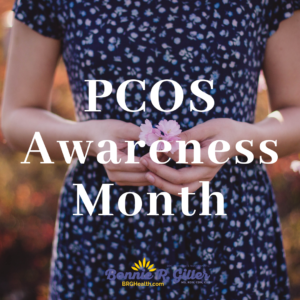PCOS Awareness Month Blog
 Polycystic Ovary Syndrome, or PCOS, is a female reproductive disorder of the body’s endocrine system that some women and young girls experience. PCOS can lead to infertility as well as a range of serious medical conditions such as obesity, type 2 diabetes, heart disease, endometriosis, severe anxiety, depression, and liver disease.
Polycystic Ovary Syndrome, or PCOS, is a female reproductive disorder of the body’s endocrine system that some women and young girls experience. PCOS can lead to infertility as well as a range of serious medical conditions such as obesity, type 2 diabetes, heart disease, endometriosis, severe anxiety, depression, and liver disease.
September is National PCOS Awareness Month. Raising awareness helps to educate the general public about the condition and improve the lives of those affected.
About one in ten women are living with PCOS right now in the United States. That’s around 10 – 15% of the American female population. It’s estimated that an additional 50% of women may be living with PCOS but are not yet diagnosed. Women living with PCOS are three times as likely to develop endometrial cancer.
So, what should you look for if you’re wondering about PCOS?
9 Common Symptoms of PCOS:
1) Irregular periods
2) Severe acne
3) Weight gain
4) Anxiety and depression
5) Excess facial and body hair
6) Small cysts in ovaries
7) Insulin resistance
8) Infertility
9) Male pattern hair loss
If you have some of the symptoms above, it’s important to head over to your gynecologist or primary care doctor to discuss your concerns and they can help determine the most appropriate next step for you. Remember, everyone is always different!
Insulin Resistance
Women with PCOS tend to have higher insulin levels. Insulin is a hormone produced by your pancreas to help your cells uptake glucose (or sugar). The high insulin levels can lead to insulin resistance, which may lead to your ovaries producing more testosterone leading to an increase in your PCOS symptoms. Making certain food and lifestyle changes can help improve the insulin resistance.
5 Nutrition Changes to Help PCOS
- Increase your fiber intake – Fiber is found in plant foods. It helps to keep your digestion system regular and help you feeling fuller for longer. Fiber can also help with lowering your cholesterol levels. Some good choices include oatmeal, brown rice, sweet potato, lentils, and apples.
- Choose anti-inflammatory foods – Foods that have anti-inflammatory properties mean they can help your body fight inflammation. Inflammation can cause a number of ailments, including exacerbating PCOS symptoms – thus trying to add more anti-inflammatory foods in your diet can be beneficial. Foods with anti-inflammatory properties include fattyfish (salmon, tuna),legumes, green tea, and low-fat dairy.
- Incorporate more plant-based proteins – Plant based proteins are typically lower in fat, higher in fiber and other important nutrients for your body. By replacing a few meat filled meals (or all – whatever you choice), you’ll find your diet is not missing very much. Plant based proteins include soy products (tofu, edamame), beans, lentils, chickpeas, nuts (almonds, peanuts), quinoa and chia seeds.
- Stock up on antioxidants –These are protective compounds found in certain foodsthat can help prevent damage to your cells.They help to neutralize the “free radicals” that would cause damage. The free radicals can be from inflammation or environmental factors. Foods with antioxidant properties include most fruits and vegetables, pecans, and beans.
- Consider nutritional supplements– Studies suggests that supplementing certain nutrients such as Vitamin D, fish oil, or Vitamin B12 can be beneficial. These nutrients are important as it can be hard to get enough vitamin D depending on where you live, vitamin B12 is only in animal products and fish oil helps provide anti-inflammatory properties into your diet if you are not a big seafood eater. Remember, always consult with your doctor or dietitian before using any nutritional supplement.
Making changes to your lifestyle and diet may be your best option when looking to improve PCOS. Working closely with a dietitian can help you reach your goals even more effectively. You can contact me here if you are looking for more individual guidance on how you can make dietary changes.
Your Turn to Take Action:How will you raise awareness about PCOS this month? Let me know in the comments below!


Leave a Reply
Want to join the discussion?Feel free to contribute!